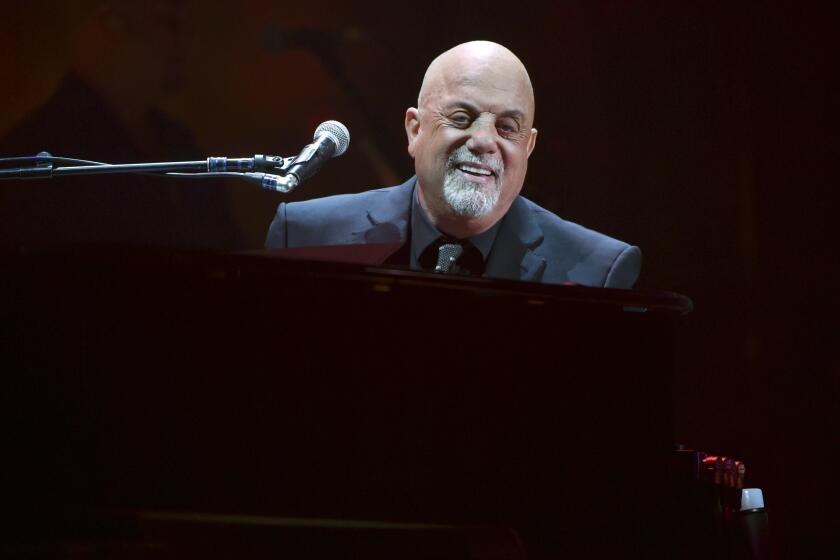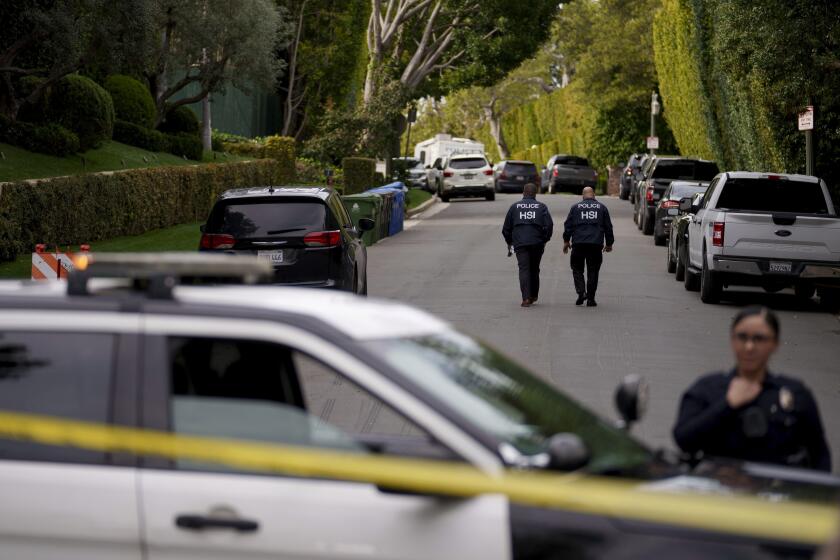Nellie Lutcher, 94; jazz piano player, songwriter and R&B; recording artist
At the age of 11, Nellie Lutcher was playing piano for Ma Rainey, the legendary blues singer. By the time Lutcher arrived in Los Angeles 12 years later, her impressive resume included gigs with the band of trumpeter Bunk Johnson.
But at the Dunbar Hotel on Central Avenue, where Lutcher earned $2 a night performing in 1935, people wanted to hear more than her piano; they begged her to sing. Lutcher resisted, finally gave in and went on to make a string of hit records in the 1940s and ‘50s that won her acclaim for both her swinging piano and her playful vocals.
Of the artist behind “He’s a Real Gone Guy” and “Hurry On Down,” the late jazz critic Leonard Feather once wrote: “Nellie Lutcher’s name stands for much woman, much music and much heart.”
Lutcher died Friday from complications of old age at a nursing home in Los Angeles. She was believed to be 94, though some biographical accounts list her age as 91.
Often described as a jazz singer, Lutcher’s vocal and piano sound did not lend itself to easy classification.
She belonged to a group of musicians whose recordings, one critic said, “were among the foundation stones of rock.”
Lutcher begged to differ.
“I’m a little bit of jazz, a little rhythm and blues. I do pop things and I like ballads,” she told the New Orleans Times-Picayune in 1993. “But I don’t consider myself anything of rock. Whatever I did I made sure it was something I could restyle, because my whole thing was to give everything a creative, individual touch.”
Born in Lake Charles, La., on Oct. 15, 1912, Lutcher was one of 10 surviving children born to bass player Isaac Lutcher, who supported his family with a job at a packinghouse, and Susie Lutcher, who had aspired to be a pianist. Nellie Lutcher’s brother Joe was a saxophonist who also had hit records in the 1940s.
Lutcher began studying piano when she was 6 and played piano at her church in Lake Charles when she was 8.
She moved to Los Angeles to hone her skills as a composer and arranger. But at the Dunbar Hotel, fans placed a glass on her piano to hold tips and filled it handsomely whenever she sang.
“I didn’t consider myself a vocalist; I called myself a song designer,” she said, but fans thought otherwise.
In the late 1940s, Lutcher was part of a group of African American women, including Hadda Brooks, Mabel Scott, and Paula Watson, who made names for themselves as pianist-singers, said Jim Dawson, author of several books on rock ‘n’ roll.
“These were all very accomplished women,” Dawson said. “But Nellie Lutcher was really the leader of the pack. She set the standard and she was the one having the big hits.”
As a writer Lutcher mastered the double entendre; there was a sly and clever element to her lyrics. She enjoyed her craft and infused performances with joy, said her son, Talmadge Lewis.
“She was very comical,” he said, “very lively, very bubbly, very expressive.”
Over the years, Lutcher’s career blossomed. She played the Club Bali on the Sunset Strip and Club Royale at Florence Avenue and Broadway. A pivotal moment came in 1947, when Frank Bull, a deejay on radio station KFWB-AM, gave her a chance to perform live on a benefit show. Dave Dexter Jr. of Capitol Records heard her, and signed her.
“She had eight top 10 R&B; records between 1947 and 1950,” said Tom Reed, author of “The Black Music History of Los Angeles -- Its Roots.” “She did it all. She was an entertainer, composer, arranger, writer, pianist, singer.”
Lutcher’s fame extended across the continent at the height of her success.
She was so beloved in England that police officers escorted her to her hotel after a performance to prevent fans from mobbing her. Lutcher recorded two duets with Nat King Cole, “Can I Come in for a Second?” and “For You, My Love,” both in 1950. Two years later, she was the subject of an episode of “This Is Your Life” on television.
But opportunities dried up with the emergence of rock ‘n’ roll, and difficult business experiences made her hesitant to record again.
“Like a lot of other people, I was shortchanged regarding my royalties so I really have not had a desire to do any recording,” she said in the Times-Picayune article. “For some reason I can’t forget what happened.”
In the late 1980s through the 1990s she emerged from what she called semiretirement to perform at the Cinegrill in Hollywood.
In 1992 music critic Don Heckman, writing in the Los Angeles Times, noted that Lutcher had lost “none of her exuberance, charm, enthusiasm and sheer, quirky musicality.... Her buoyant sense of swing and the joy which she invests [in] everything she sings, should be part of a required observation course for anyone hoping to become a musical performer.”
Her marriage to Leonel “Buddy” Lewis ended in divorce. In addition to her son, she is survived by a granddaughter, Kira Lewis, of Concord, Calif.; and a sister, Margie Lutcher Levy, of Los Angeles.
More to Read
The biggest entertainment stories
Get our big stories about Hollywood, film, television, music, arts, culture and more right in your inbox as soon as they publish.
You may occasionally receive promotional content from the Los Angeles Times.






